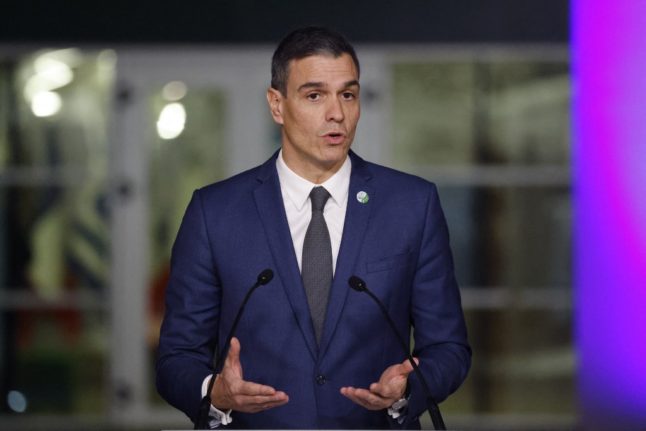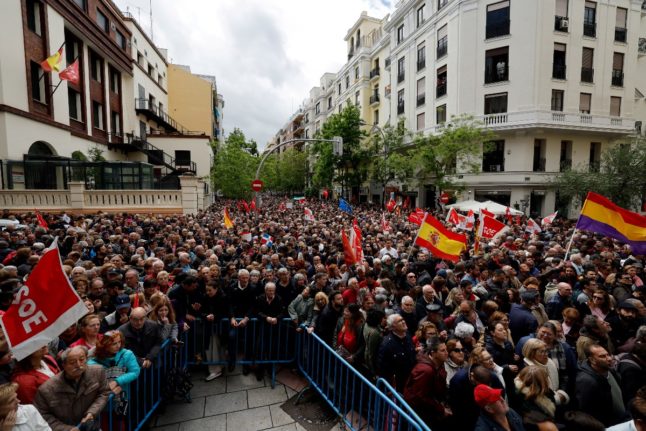The legislation seeks to lower the penalty for misuse of public funds and to abolish the charge of sedition, both of which were used against the Catalan leaders behind the failed 2017 independence bid.
Following a tense plenary session, the bill passed with 184 votes in favour, 64 against and one abstention.
Both proposals have stirred up fierce opposition not only from Spain’s right-wing opposition but from the ranks of Prime Minister Pedro Sánchez’s own Socialist party.
“It is unacceptable to strike a bargain with criminals over their own conviction,” railed Emiliano García Page, the Socialist leader of the Castilla-La Mancha region.
Opposition leader Alberto Núñez Feijóo of the right-wing Popular Party (PP) said it was “unprecedented in a democracy to create a criminal code that was tailor-made for convicts”, accusing Sánchez of losing his “legitimacy” to rule.
Sánchez himself acknowledged at the weekend it was a “risky” move but said there was “no other way” of “rescuing Catalonia from crisis” and promoting “coexistence”.
READ MORE: Why Spain’s right is vehemently opposed to changes to its sedition law
Boon for the separatists
Since becoming premier in June 2018, Sánchez has adopted a strategy of “defusing” the conflict in Catalonia following the failed independence bid which threw Spain into its worst political crisis in decades.
He has kept up dialogue with the moderate separatists of ERC, who run the regional government in Catalonia and in 2021, he pardoned nine separatist leaders who had been jailed for between nine and 13 years for their part in the secession attempt.
Currently, those convicted of misuse of public funds face between two and six years in prison and are banned from public office for six to 10 years.
With aggravated circumstances, that could be extended to between four and eight years of jail, with a ban of 10 to 20 years. Under the new legislation, however, those penalties would be reduced to one to four years behind bars, with a ban of between two and six years.
The legal changes could also soften any future sentence for Carles Puigdemont, the Catalan leader in 2017 who fled abroad with two others to escape prosecution.
All three are wanted on charges of sedition and misuse of public funds.
Of the Catalan leaders jailed over the independence bid who were subsequently pardoned, all nine were charged with sedition but only four were convicted of misuse of public funds.
And because sentences can be retroactively modified in Spain if changes to the penal code benefit convicted offenders, it could help the four who are still facing a ban on holding public office.
Concretely, it could allow former Catalan deputy leader Oriol Junqueras, who heads ERC, to return to politics in the coming years.
READ ALSO: No regrets, says Catalan ex-minister on referendum anniversary
‘Very sensitive issue’
But Sánchez’s strategy “is, above all, political”, says Paloma Román, a political scientist at Madrid’s Complutense University.
It is about “consolidating a majority” for his minority government which will have to rely on support from ERC and other small regional parties ahead of elections which are due by late 2023.
The danger, she said, is that reducing the penalty for misuse of public funds could anger the public in a country “rocked in recent years by serious corruption scandals” including one involving the PP which allowed Sánchez to seize power in 2018.
Misuse of public funds is “a very, very sensitive issue” for those voters who support Sanchez’s Socialist party and its hard-left coalition partner Podemos, which has long championed anti-corruption initiatives, said political scientist Cristina Monge.
“The fight against corruption is one of the party’s flagship issues,” she said. Podemos has distanced itself from the bill.
Although the reforms are understandable in the context of Catalonia hoping to turn the page, “that is not the case in Spain as a whole”, she told AFP.
And it could become a problem for the government if the new law ends up “freeing politicians accused of corruption from prison” or allowing those banned from holding office to to have their names back on electoral lists.
If that happens, it will “set the scene for the (upcoming) election campaign” and will provide a powerful tool for the PP, which current polls suggest would win the vote — although it would only be able to rule if it joined forces with the far-right Vox.
READ ALSO: Who will win Spain’s 2023 election – Sánchez or Feijóo?



 Please whitelist us to continue reading.
Please whitelist us to continue reading.
Member comments